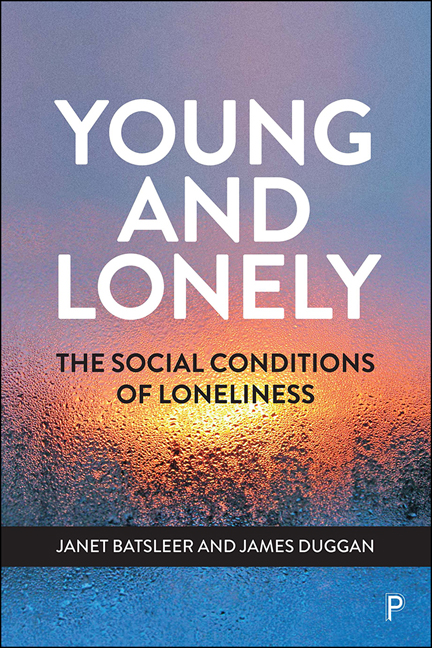Book contents
- Frontmatter
- Contents
- Notes on the Authors
- Acknowledgements
- Preface
- 1 Animate, Attune, Amplify
- 2 Finding Oneself a Loneliness Agenda
- 3 I’M New Here: Creating a New Research Project and A Young Person Led Research Agenda
- Part I The Social Conditions of Loneliness
- Part II The Experience of Loneliness
- Part III Building Friendship and Connection
- References
- Index
2 - Finding Oneself a Loneliness Agenda
Published online by Cambridge University Press: 18 March 2021
- Frontmatter
- Contents
- Notes on the Authors
- Acknowledgements
- Preface
- 1 Animate, Attune, Amplify
- 2 Finding Oneself a Loneliness Agenda
- 3 I’M New Here: Creating a New Research Project and A Young Person Led Research Agenda
- Part I The Social Conditions of Loneliness
- Part II The Experience of Loneliness
- Part III Building Friendship and Connection
- References
- Index
Summary
Youth loneliness is an issue that evidently has come of age. It is nevertheless a puzzle that in the twenty-teens we are concerned that arguably the most connected generation in human history is struggling with loneliness and social isolation. Yet this seems to be the case.
Alongside interest in elder loneliness, the response to youth loneliness has been remarkable. Internationally, public health officials, researchers and the media claim we are facing a loneliness epidemic (Murthy, 2016; Holt-Lunstad, 2017; Easton, 2018; Howe, 2019). In the UK, we have seen a range of charity reports and strategy documents on loneliness (Griffin, 2010; Kantar Public et al, 2016), the creation of dedicated funding programmes (for example, Co-op Foundation's Belong network; DCMS and Co-op Foundation's Spaces to Connect programme), a government strategy document and an international first in the appointment of a ‘minister for loneliness’ (DCMS, 2018). Nevertheless, this book is in part a call to pause and rethink the youth loneliness agenda as can be evidenced through key features of the emerging national conversation.
The second part of the research's aim was to amplify the voices of young people in this conversation about youth loneliness. There is not enough space to tell the complete story of the rise of youth loneliness as a high-profile media and policy concern. Instead, we will explore a series of trends and milestones that emerged through a number of contingent events, with a view to creating a more unsettled and open way of thinking about young people and loneliness. This chapter therefore outlines the features of the loneliness agenda with sections on the need for addressing youth loneliness now and the factors troubling the youth loneliness agenda in relation to neoliberalisation and austerity as well as contagion and crisis.
Why youth loneliness now?
A question we returned to throughout the research was, why youth loneliness now? What does thinking of loneliness illuminate or obscure in the contemporary experience of young people? Academics and practitioners are only too grateful to be working on an issue that enters the spotlight with the associated funding. We often fail or cannot afford to question why everyone is suddenly paying attention. So: why youth loneliness now?
- Type
- Chapter
- Information
- Young and LonelyThe Social Conditions of Loneliness, pp. 11 - 22Publisher: Bristol University PressPrint publication year: 2020



